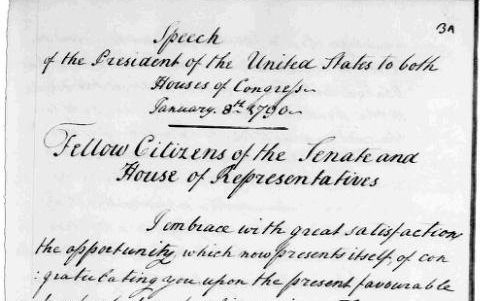State of the Union 2022: The Need To Look Beyond Macrocosmic Partisanship And Into One’s Inner Self and Circle

Jônatas Santana
The State of the Union Address (SOTU) by President Joe Biden on March 1st, 2022, was the last in a centennial series of addresses, which has become customary, since Woodrow Wilson, for the President of the United States to appear before a joint session of Congress, and expound on the domestic and foreign issues of the country, and how it is fairing during the given administration. That custom stems from Article II, Section 3, of the Constitution which states “he [the president] shall from time to time give to the Congress Information of the State of the Union, and recommend to their Consideration such Measures as he shall judge necessary and expedient; he may, on extraordinary Occasions, convene both Houses, or either of them, and in Case of Disagreement between them, with Respect to the Time of Adjournment, he may adjourn them to such Time as he shall think proper; he shall receive Ambassadors and other public Ministers; he shall take Care that the Laws be faithfully executed, and shall Commission all the Officers of the United States.”
As I started doing the necessary research to analyze the current State of the Union, not only through President Biden’s eyes, but through an all-encompassing outlook, I realized how incapable I am to write upon the matter, for much context is needed to understand how the United States got here, through all of its incremental changes threaded by both parties throughout the decades, and it is very difficult to pin-point all the reasons to its current state, whether one likes it or not. Before one is able to make such an analysis, one needs, in my opinion, to understand the socio-economics, anthropology, religion of the United States and its demographics, psychological state, the natural environment and its resources. Indeed, the very background of all members of the Congress and the executive branch, and how they interact become relevant items to analyze. So too are foreign issues, education, and so on. These are macro issues, which everyone seems to have an opinion on, but there are micro issues, which almost no one pays attention to. These are the nitty gritty work of state or municipality legislature for example, and in the face of such complexity, one should be careful to give brash answers, and instead look for the answers in more practical ways, from inside out, because more often than not, they [answers] can be very subtle, and they could very well start within the microcosm, and not the macrocosm.
The executive scope of Washington is much more glamorous than local or state politics, but much harder toachieve results, according to Barack Obama’s early career advice when he started to work in Illinois’ politics. Such scope deals with the entirety of the picture, putting together municipalities, states, and foreign affairs. Therefore, if the houses of the municipality and state are not functioning well, with the passing of laws that upholds justice, how can the United States work within itself and with other countries? Now the question may be ‘what is justice’? It might be the very heart of the matter in the chaos of all levels of politics. But here I would only like to instigate the readers to really go look for themselves what justice is, with humility and an open ear.
As I watched the SOTU Address of 2022, 2020, 2012, 2008, and 1965, I noticed an odd amount of cheering in between almost every sentence or so, and not to my surprise, there is a story behind this as well. Dueling standing ovations, often triggered by the mos t banal comment, started way back in the 80s, during Reagan’s administration. One could make the argument that the glamor of Washington grew even more so then, and America’s thirst for entertainment in everything, including the sacredness of the country’s leadership. However, this is still way too superficial of an argument to make. I am not trying to blame Reagan for the partisanship wars and drama. I am only trying to warn about how very small details such as this, that could have influenced the way politics are made, and once time accumulates all such details, one can forget why one is at the current state of being to begin with. Each person therefore should be responsible to take a step back from the grandeur and glamor of the big stage, and look into the small pieces that make up all that is around us, starting with oneself, and people around you. It is very difficult to talk about certain values, religion, and politics, but it is much more doable on a small and respectful scale, where one is not caught up by the much bigger winds of doctrine.
Administrations come and go, and they at times work towards preserving their legacies, instead of the very foundations of the country’s government. It is understandable, it is difficult to start afresh and take a leap of faith to fix things, and rather cling to the status-quo. Therefore, the responsibility lies with each and everyone of us, and if one is able to do all they can within their reach, in a manner which is not destructive, the State of the Union would incrementally shift to a more unified reality.